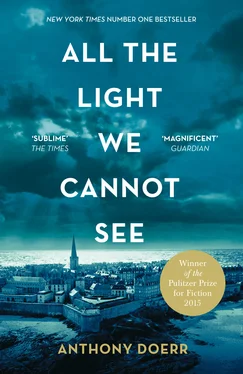France.
Intercoms crackle. Deliberately, almost lazily, the bombers shed altitude. Threads of red light ascend from anti-air emplacements up and down the coast. Dark, ruined ships appear, scuttled or destroyed, one with its bow shorn away, a second flickering as it burns. On an outermost island, panicked sheep run zigzagging between rocks.
Inside each airplane, a bombardier peers through an aiming window and counts to twenty. Four five six seven. To the bombardiers, the walled city on its granite headland, drawing ever closer, looks like an unholy tooth, something black and dangerous, a final abscess to be lanced away.
In a corner of the city, inside a tall, narrow house at Number 4 rue Vauborel, on the sixth and highest floor, a sightless sixteen-year-old named Marie-Laure LeBlanc kneels over a low table covered entirely with a model. The model is a miniature of the city she kneels within, and contains scale replicas of the hundreds of houses and shops and hotels within its walls. There’s the cathedral with its perforated spire, and the bulky old Château de Saint-Malo, and row after row of seaside mansions studded with chimneys. A slender wooden jetty arcs out from a beach called the Plage du Môle; a delicate, reticulated atrium vaults over the seafood market; minute benches, the smallest no larger than apple seeds, dot the tiny public squares.
Marie-Laure runs her fingertips along the centimeter-wide parapet crowning the ramparts, drawing an uneven star shape around the entire model. She finds the opening atop the walls where four ceremonial cannons point to sea. “Bastion de la Hollande,” she whispers, and her fingers walk down a little staircase. “Rue des Cordiers. Rue Jacques Cartier.”
In a corner of the room stand two galvanized buckets filled to the rim with water. Fill them up, her great-uncle has taught her, whenever you can. The bathtub on the third floor too. Who knows when the water will go out again.
Her fingers travel back to the cathedral spire. South to the Gate of Dinan. All evening she has been marching her fingers around the model, waiting for her great-uncle Etienne, who owns this house, who went out the previous night while she slept, and who has not returned. And now it is night again, another revolution of the clock, and the whole block is quiet, and she cannot sleep.
She can hear the bombers when they are three miles away. A mounting static. The hum inside a seashell.
When she opens the bedroom window, the noise of the airplanes becomes louder. Otherwise, the night is dreadfully silent: no engines, no voices, no clatter. No sirens. No footfalls on the cobbles. Not even gulls. Just a high tide, one block away and six stories below, lapping at the base of the city walls.
And something else.
Something rattling softly, very close. She eases open the left-hand shutter and runs her fingers up the slats of the right. A sheet of paper has lodged there.
She holds it to her nose. It smells of fresh ink. Gasoline, maybe. The paper is crisp; it has not been outside long.
Marie-Laure hesitates at the window in her stocking feet, her bedroom behind her, seashells arranged along the top of the armoire, pebbles along the baseboards. Her cane stands in the corner; her big Braille novel waits facedown on the bed. The drone of the airplanes grows.
Five streets to the north, a white-haired eighteen-year-old German private named Werner Pfennig wakes to a faint staccato hum. Little more than a purr. Flies tapping at a far-off windowpane.
Where is he? The sweet, slightly chemical scent of gun oil; the raw wood of newly constructed shell crates; the mothballed odor of old bedspreads—he’s in the hotel. Of course. L’hôtel des Abeilles, the Hotel of Bees.
Still night. Still early.
From the direction of the sea come whistles and booms; flak is going up.
An anti-air corporal hurries down the corridor, heading for the stairwell. “Get to the cellar,” he calls over his shoulder, and Werner switches on his field light, rolls his blanket into his duffel, and starts down the hall.
Not so long ago, the Hotel of Bees was a cheerful address, with bright blue shutters on its facade and oysters on ice in its café and Breton waiters in bow ties polishing glasses behind its bar. It offered twenty-one guest rooms, commanding sea views, and a lobby fireplace as big as a truck. Parisians on weekend holidays would drink aperitifs here, and before them the occasional emissary from the republic—ministers and vice ministers and abbots and admirals—and in the centuries before them, windburned corsairs: killers, plunderers, raiders, seamen.
Before that, before it was ever a hotel at all, five full centuries ago, it was the home of a wealthy privateer who gave up raiding ships to study bees in the pastures outside Saint-Malo, scribbling in notebooks and eating honey straight from combs. The crests above the door lintels still have bumblebees carved into the oak; the ivy-covered fountain in the courtyard is shaped like a hive. Werner’s favorites are five faded frescoes on the ceilings of the grandest upper rooms, where bees as big as children float against blue backdrops, big lazy drones and workers with diaphanous wings—where, above a hexagonal bathtub, a single nine-foot-long queen, with multiple eyes and a golden-furred abdomen, curls across the ceiling.
Over the past four weeks, the hotel has become something else: a fortress. A detachment of Austrian anti-airmen has boarded up every window, overturned every bed. They’ve reinforced the entrance, packed the stairwells with crates of artillery shells. The hotel’s fourth floor, where garden rooms with French balconies open directly onto the ramparts, has become home to an aging high-velocity anti-air gun called an 88 that can fire twenty-one-and-a-half-pound shells nine miles.
Her Majesty, the Austrians call their cannon, and for the past week these men have tended to it the way worker bees might tend to a queen. They’ve fed her oils, repainted her barrels, lubricated her wheels; they’ve arranged sandbags at her feet like offerings.
The royal acht acht, a deathly monarch meant to protect them all.
Werner is in the stairwell, halfway to the ground floor, when the 88 fires twice in quick succession. It’s the first time he’s heard the gun at such close range, and it sounds as if the top half of the hotel has torn off. He stumbles and throws his arms over his ears. The walls reverberate all the way down into the foundation, then back up.
Werner can hear the Austrians two floors up scrambling, reloading, and the receding screams of both shells as they hurtle above the ocean, already two or three miles away. One of the soldiers, he realizes, is singing. Or maybe it is more than one. Maybe they are all singing. Eight Luftwaffe men, none of whom will survive the hour, singing a love song to their queen.
Werner chases the beam of his field light through the lobby. The big gun detonates a third time, and glass shatters somewhere close by, and torrents of soot rattle down the chimney, and the walls of the hotel toll like a struck bell. Werner worries that the sound will knock the teeth from his gums.
He drags open the cellar door and pauses a moment, vision swimming. “This is it?” he asks. “They’re really coming?”
But who is there to answer?
Up and down the lanes, the last unevacuated townspeople wake, groan, sigh. Spinsters, prostitutes, men over sixty. Procrastinators, collaborators, disbelievers, drunks. Nuns of every order. The poor. The stubborn. The blind.
Some hurry to bomb shelters. Some tell themselves it is merely a drill. Some linger to grab a blanket or a prayer book or a deck of playing cards.
Читать дальше












